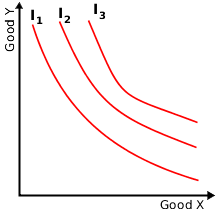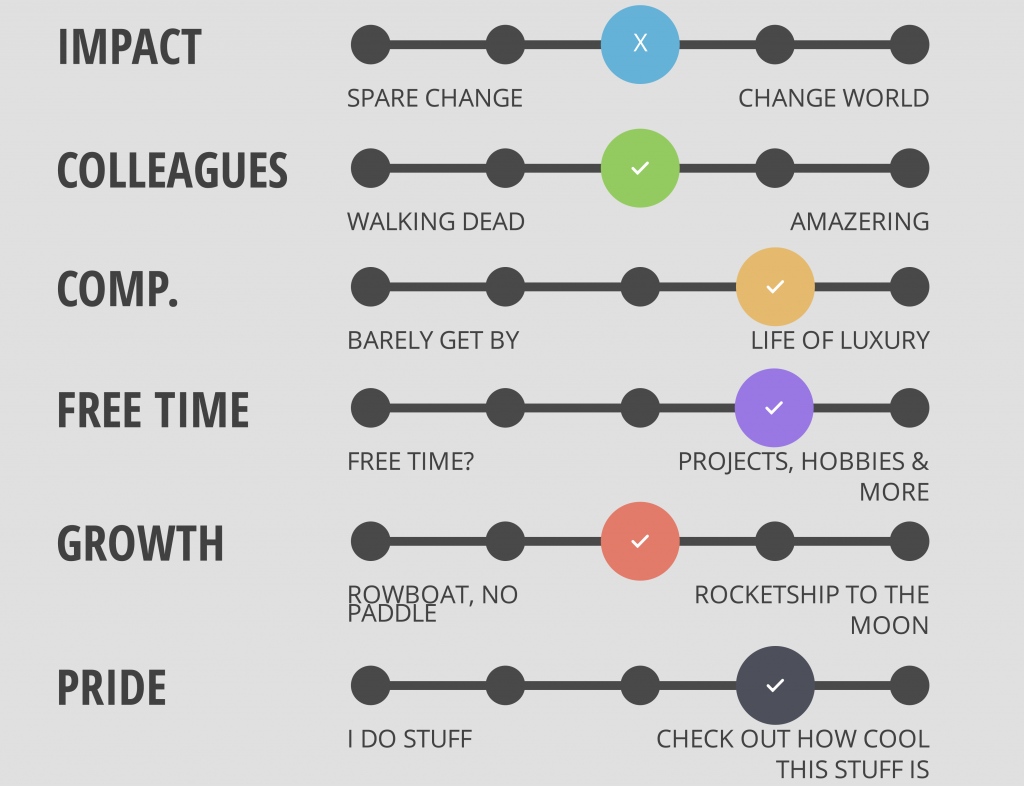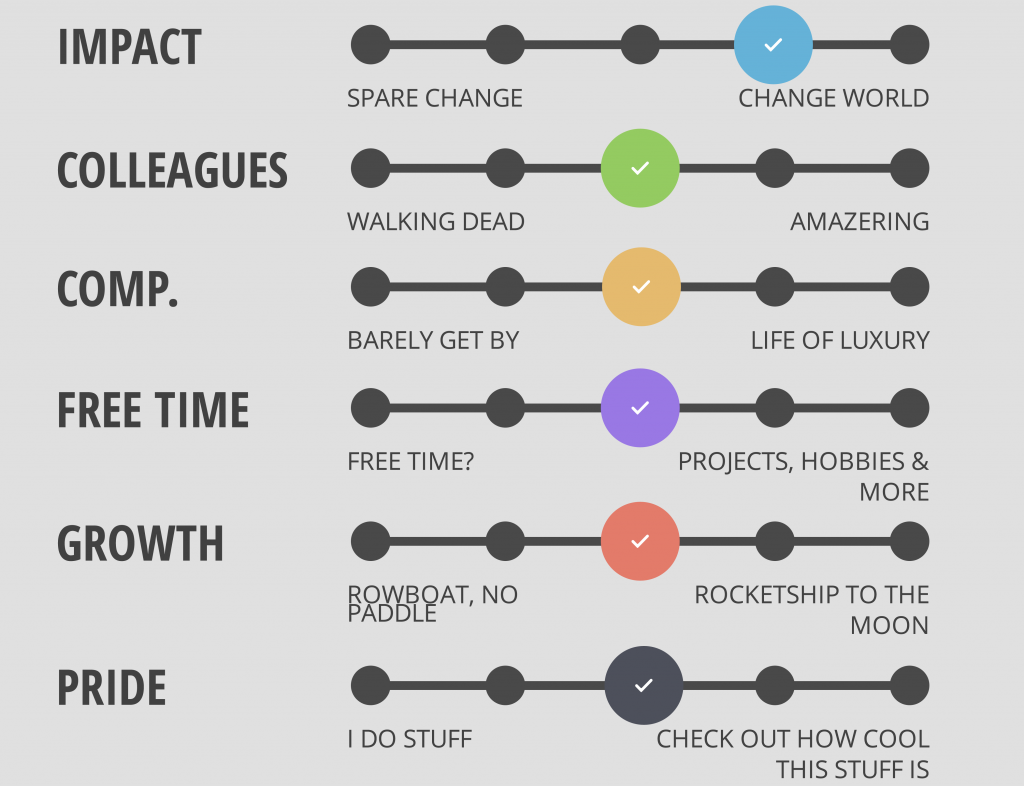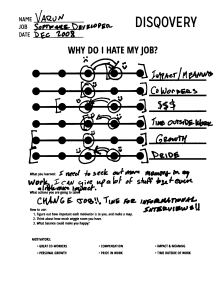Why do I hate my job?
Welcome to the club. About a quarter of people 23 to 33 hate their jobs, too. There are some really great reasons to hate your job and stick with it, but if you’re here you’re looking to mix it up and make some positive moves. Fortunately there are a bunch of things you can do to improve your situation without changing jobs. Lucky you.
This post is part 1, about motivators. Part 2 will be about skills, projects, and people.
But I loved my job before, what happened?
Well, one of a couple of things probably happened. You might have been lying to yourself: you might have been so blinded by the excitement of getting a job, or of working at XYZ Industries that you weren’t paying attention to your true feelings until now. There’s no blame here: finding a job can be tough, and I’ve heard XYZ is doing some amazing work these days.
[caption id="attachment_164" align="aligncenter" width="250"] Where Squidward was once happy…[/caption]
Where Squidward was once happy…[/caption]
[caption id="attachment_163" align="aligncenter" width="250"] things can get real old, real fast…[/caption]
things can get real old, real fast…[/caption]
You might have genuinely loved what you are doing. But you, and many others, crave variety. Too much of a good thing gets real old, real fast.
Or, your job might have simply gone out of alignment with what you're looking for. Before going through a whole job-hunting cycle, let's see what you can do in your current situation.
What do I hate about my job?
Let’s be more constructive than, “My boss sucks,” even though that might be true. Here are some common reasons for job dissatisfaction:
- Insufficient compensation
- Too much work
- Not enough impact or significance in work
- Not proud of your work
- Boring colleagues
- Feeling like you’re not growing
- Incompatible with life - too much travel, too little travel, no family programs, bad insurance
Do any of these feel familiar? I bet they do, even if you still love your job. The opposite of each of these reasons is a motivator - something that can encourage you to work. The thing about these motivators is that they are relative, and the importance of each one of them is unique to you.
Your motivators are yours, no one else’s.
As an example, let’s look at my motivators in order from most important to least important:
- Finding meaning in my work
- Awesome colleagues
- Receiving sufficient compensation
- Work leaves time for family and friends
- Feeling like I’m growing
- Taking pride in my work
Yes, it’s tough to figure out what your motivators are, but if you’re unhappy with your job, at least we know that the current balance is no good. There are some assessments that can help you figure out your motivators, and a skilled career coach can certainly help. But even just brutal honesty with yourself will get you most of the way to finding your balance.
[caption id="attachment_177" align="alignleft" width="217"] Every combination of X and Y that falls along curve I2 is equally good.[/caption]
Every combination of X and Y that falls along curve I2 is equally good.[/caption]
Balance is the key word here. I don’t necessarily need 1) a ton of meaning and 2) superlative colleagues to be happy; I might be just as happy with 1) some meaning, 2) great colleagues, 3) great pay, and 4) great work-life balance. Economists would call a chart connecting all these points an indifference curve. A combination of elements that will leave you just as satisfied as another combination. The difference here is that economists usually only draw charts comparing amounts of two dimensions, but we’re looking at 6 or more. Yes, real life is more complicated than economic models. Surprise, surprise.
All of these motivators are important. For example, too often these days people are ashamed to say that they care about compensation. But if more money makes you happy, lying to yourself and others is just going to result in you being miserable!
How do I use this to be happy?
Indifference curves are cool, but you are tired and you want things to actually get better. You can download this template to follow along and try it out at home. I find using paper makes it more effective. I'll use an example from my time at Microsoft.
Figure out how important each motivator is to you, and make a map.
Label the sliders from top to bottom with the appropriate headings. I went over what my priorities are above.
Map out where your current job falls on satisfying each of these motivators.
What's important is to remember that they're all relative; there is no right and wrong, only how much they mean to you. As a developer I had a very pleasant job, but I felt unable to make the kind of impact I wanted on product development and on our users.
[caption id="attachment_174" align="aligncenter" width="625"] Feeling unsatisfied as a developer, but not by much.[/caption]
Feeling unsatisfied as a developer, but not by much.[/caption]
Think about how much wiggle room you have.
In almost any job you can potentially get more of something that matters to you. Sometimes it could be free, such as getting assigned to a project with people you like more; sometimes it might come at a cost, such as working on a more meaningful project that has less bonus potential. If you have absolutely no wiggle room on any of these sliders, you should probably leave. I knew that I could get the impact I was looking for by transitioning to a program management job. I would earn smaller bonuses and have less free time; the product I'd work on would also be less "mainstream".
What balance could make you happy?
You're not happy now, but can you get more of something that's more important to you, even at the expense of something less important? How would it feel? How quickly can you make those changes? Many times it is far easier than you expect. Looking at what makes me happy, those were sacrifices I was ready to make. It took a few months of conversations and interviews, after which I made the transition.
[caption id="attachment_173" align="aligncenter" width="625"] Giving up some stuff I don't care too much about, in order to get Impact, which I find much more valuable.[/caption]
Giving up some stuff I don't care too much about, in order to get Impact, which I find much more valuable.[/caption]
Now what?
The second post will focus more on the skills, projects, and people side of job satisfaction instead of motivators at large.
For funsies, here is a version that I filled out for my story from 2009. Since these things are pretty personal it might be hard to understand. I started by prioritizing my motivators, marking where my job was, figured out what range would make me happy, and looked at the effects of a potential move.
All we at Disqovery can really do is help you consider what actions to take. You're going to have to go out there and do it for yourself. Godspeed. Again, you can download a worksheet and try this exercise yourself.
